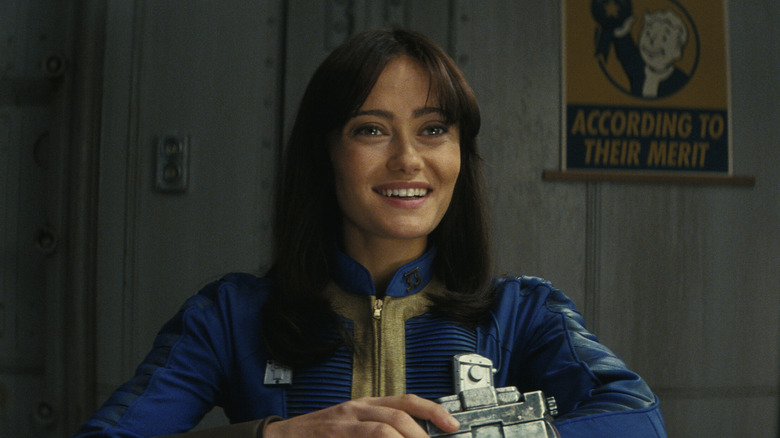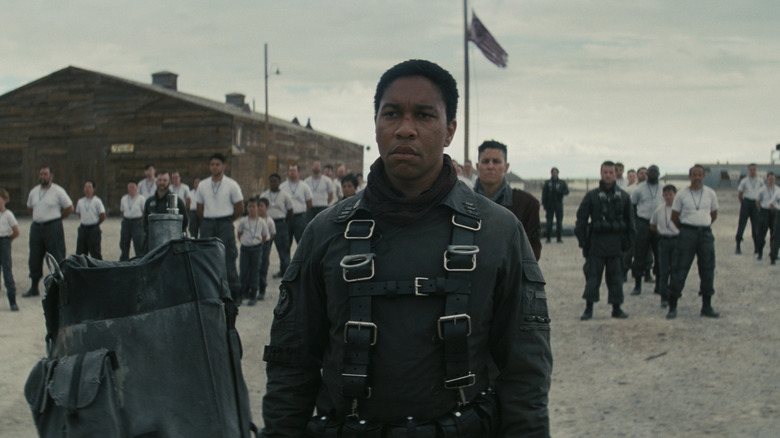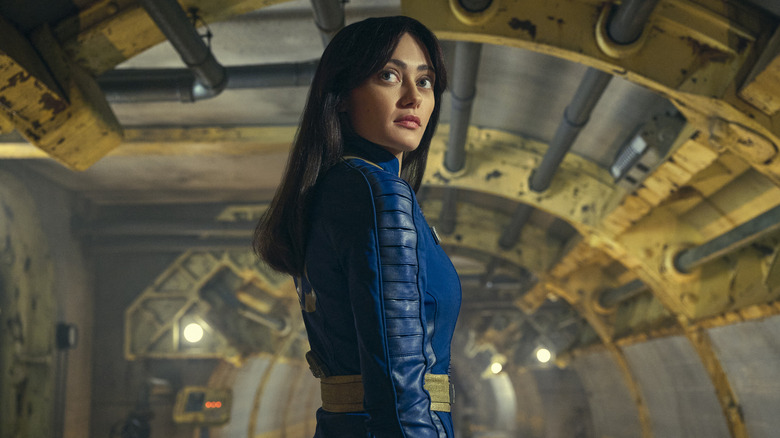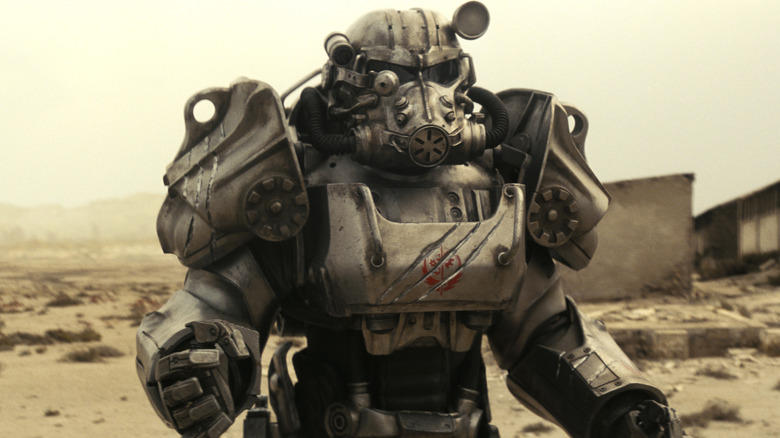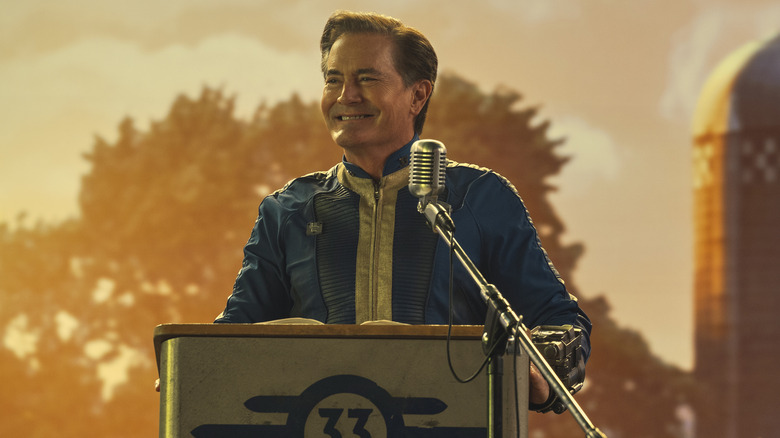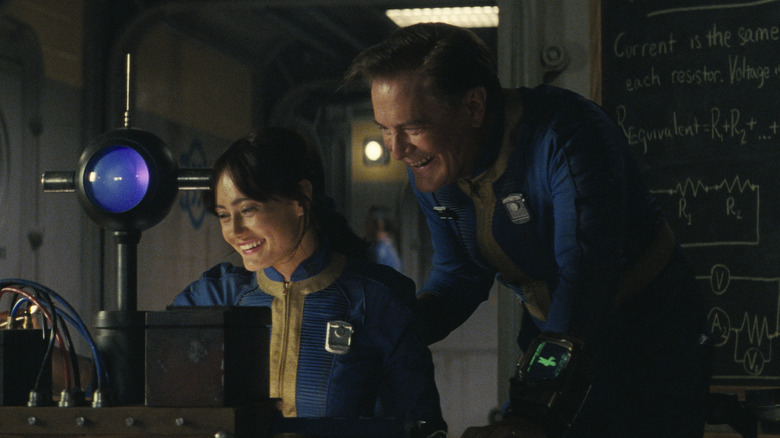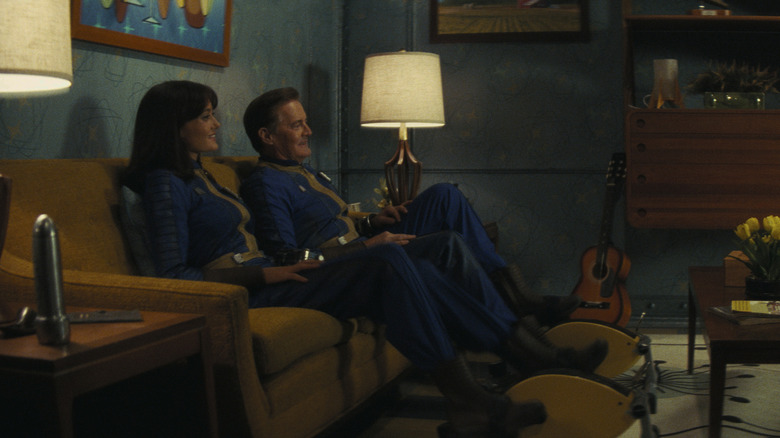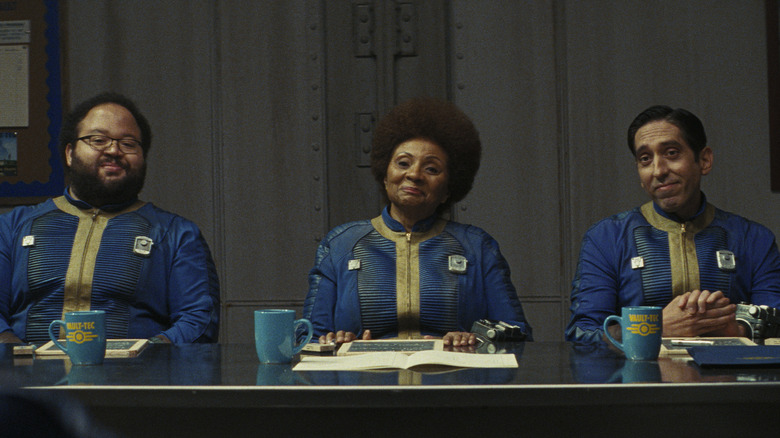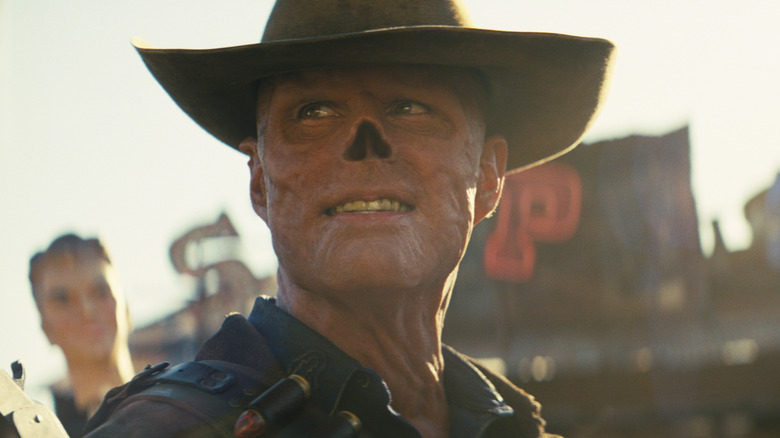The Fallout Cast Reveal The Good, The Bad And The Ugly That Inspired Their Roles - Exclusive Interview
Back in 2022, fans of the "Fallout" video game franchise got their first look at Amazon Prime Video's adaptation with a glimpse into what the Vault would look like. By the time the full "Fallout" trailer came out, many said the same thing about Walton Goggins' Ghoul and what the show looked like as a whole: this was going to be good. The TV series successfully manages to encapsulate the expansive scope of the games by honing in on characters gamers know all too well, such as the wide-eyed Vault Dweller, Lucy (Ella Purnell), as well as Maximum (Aaron Moten), a squire within the Brotherhood of Steel. That's only a small sampling of the eclectic characters attempting to survive out in the Wasteland.
The show fluctuates between intense action and extremely dark comedic sensibilities, all while having quite a few prescient things to say about the real world. And it took a small army to bring such a project to fruition. The director of the first three episodes, Jonathan Nolan, spoke with Looper about how the "Fallout" franchise might have influenced "The Dark Knight Rises." However, Looper also had a chance to speak with some of the actors in the show, like the aforementioned Purnell and Moten, in addition to Kyle MacLachlan. All of them spoke about their unique experiences bringing the post-apocalyptic world of the games to live-action as well as what influenced their various characters.
Looper also spoke exclusively with the "Fallout" showrunners — Graham Wagner and Geneva Robertson-Dworet — who come from different backgrounds but came together to form something entirely wonderful. The show may feature the end of the world as we know it, but everyone's feeling fine.
What video games do Ella Purnell and Aaron Moten play?
What was your familiarity with the games prior to getting cast on "Fallout," or did you start playing them to learn more about the world or your characters?
Aaron Moten: Ella plays.
Ella Purnell: I play. I knew of the games I hadn't played. I tried playing "Fallout 4" actually. I didn't get very far. I had a problem with a dog. I couldn't leave the dog at the gas station. It's a whole thing. I'm not good at the games.
Moten: You did get out of the Vault?
Purnell: Oh, yeah. I'm on level two, baby. But I just spent a lot of time watching other people play the games, which I really enjoyed and allowed me to get a lot further in a lot shorter amount of time. I didn't have all that much time to prep, a couple months maybe. You had even less time, actually. I can't complain. Did you play the games?
Moten: No, I didn't play them. I knew of them. I roamed the gaming world to some degree, so if you would've shown me a poster of it, I would've been like, "I've been seeing 'Fallout' for forever." I never got into it. Here's this weird full circle thing where my friends chose "Fallout" or they chose "Diablo," and here I am, circling around to get the real full experience that I missed out on.
What kind of games do you play, Aaron?
Moten: These days I like to just go away, which usually means finding a friend to do something competitive online. I did get into the new "Diablo," as well, and playing online with buddies. I just want something that's going to preoccupy my Google searches and my off-time without it being work. You know what I mean? Sometimes, watching TV shows and movies for me, it's like I can't turn my brain off, so that's my real escape. That's my real venture.
On some of the coolest scenes to film
Having seen the first few episodes, you both have some pretty cool action scenes to do. Were there any moments in filming that were particularly fun or memorable for whatever reason?
Moten: When we thought we were going to die.
Purnell: For me, Episode 3 was one of those episodes where you read it, and you finish the script to go, "How on earth are we going to do this? How am I going to do this?" I remember [Jonathan Nolan] said that there's one scene that involves me, the Ghoul, and some water. He said, "Do you want to do this? We can get a stunt double. You don't have to do this if you don't want to." I was like, "No, bring it on. You don't get to take this from me. I want to do this." I'm so glad I did because I don't see how I could have done it without ... I can't say it without spoilers, but I don't know how I could have acted it without actually doing it. Yeah, that was all me, and it was terrifying and exciting and probably the coolest thing I've ever done.
Moten: Yeah, there's a lot. I think of this feeling of "Put me in coach" for both of us in this show. It's still fun. What's happening is so exciting. Of course, you want to do the fight. It's really exciting, especially working with an incredible stunt team that we have this season. Gosh, it's just so fun.
Since neither of you were super familiar with the games beforehand, were there any movies, TV shows, or characters you looked toward to inform your performances?
Purnell: I have a funny reference. Well, I watch a lot of stuff, but one of the things that I really responded to was "Unbreakable Kimmy Schmidt." In the first episode, it's only really the first half of the first episode where she comes out of the ... I don't know where she's actually, she comes out from underground –
With the bunker, yeah.
Purnell: But she's so happy and has this innocence, this Snow White, Disney princess quality to her. It was really relatable for Lucy because it's just the perfect tone. It's the perfect line of: Yes, this is a heavy concept. It's a heavy theme. It's the apocalypse, but it's for our apocalypse. It's funny, it's absurd, it's ridiculous, it's dark comedy. You know what makes it more perfect is that you've taken someone like that, someone like Lucy ... Put a Disney princess who is a badass and can fight on the Wasteland. Who wouldn't want to watch that? It's super fun. That was something for me.
Moten: I feel like there were too many for me. They all blended so much into what I was trying to do. I didn't have a good hot one like that, I think, to reference. It's like there was something that always rang to me about Julius Caesar, Shakespeare, and he describes Cassius, the character, as a hungry dog. I think elements of that really dug into Maximus for me. That is the Wasteland if you ask me, and that is all the people that survive on the surface. I think there's an element of hungry dog in everyone, and it built off of that.
On working with Kyle MacLachlan and power armor
For Ella, what was it like to work with Kyle MacLachlan, and were you a fan of his prior to "Fallout?"
Moten: He's the best.
Purnell: I love Kyle so, so much. It's always slightly intimidating for me when you read something and there's so much emphasis on how close two characters are, and you're like, "Oh, I really hope we get along." Because I think chemistry is slightly inorganic. Yes, there's two actors. You can pretend, but there is also something there. Something that has to be real. Kyle is just the sweetest, most generous actor and such a great guy. We became really great friends and I just feel very, very lucky to have learned from him and worked with him. We both have similar ways of working where we like to mess around in between takes and not let it get too tight, too tense. We had a lot of fun.
For Aaron, what was it like to film those scenes in the Brotherhood Power Armor and having those almost Iron Man-type scenes with you in the armor head?
Moten: Yeah. Well, what's amazing is that the team at Legacy did an incredible job creating that suit, and it exists in many forms from them. There's a stationary suit, which we call the clamshell. There's the big, full-in-motion suit, which Adam Shippey wears, which we call maybe the Hero Power Armor. Then, there's the top half, which is what I mostly wear. I'm mostly in the top half and in the clam shell. The top half of the suit, it's extremely heavy, so the most difficult days of working for me, it's 50 to 60 pounds, and it feels great for the first 10 minutes. And then you start to feel it. You know what I mean? You start looking around and you're like, "Is the camera ready to roll? Can we get this take now?" It's like you're being slowly suffocated by the weight on your shoulders.
It's super exciting, super thrilling stuff. But Legacy also had this amazing thing with the visor that we found really fun to work with and play with. Gosh, it was just so fun at times whenever it's being remote-controlled by someone off-camera. The cue might happen, but they're so far away because we're wide in the middle of a desert somewhere that they can't hear. I'm having to say things like, "Close visor," to pretend and keep this game up with Ella that it's in my function to be able to control it. But yeah, really, it's such a beautiful suit. It really is. It's amazing to work with. It's so practical and it's so big.
Kyle MacLachlan talks getting involved with Fallout
First and foremost, we know the Vault on "Fallout" has things like Nuka-Cola. But in your perfect post-apocalyptic world, would the Vault also have cherry pie and coffee?
Kyle MacLachlan: [Laughs] Absolutely. That cherry pie would be a couple of hundred years old, but I'm sure it would be just fine. And the most important thing, of course, is the coffee, as you mentioned. And I want you to know that I'm drinking my coffee from an official Vault-Tec mug. [Holds up a fabulous Vault-Tec coffee mug and takes a sip]
Were you familiar with the "Fallout" games before getting into the show, or how did you come to learn about this world and this story?
MacLachlan: No, not familiar. The games that I played from my generation were really simple. "Defender," "Centipede." I won't go as far back as "Pong," but it was the early days. And I kind of gamed out around "Mega Man" days, but my son plays much more immersive games, although he wasn't as familiar with "Fallout." You knew who was? My nieces and my nephews knew about the game. So they explained it a little bit to me.
And then I really used the script as a blueprint, learning about and understanding this world. I read about it, of course, and tried to go in, but I realized it's a vast, very immersive experience. So I felt, "I'm a little overwhelmed here. It's not my best foot forward." But I really do appreciate what the writers and Jonah [Nolan] have created here. So I'm going to do my best to bring Hank to life, using them as my guides.
How did you come to get involved in the series? I know you worked with Graham Wagner on "Portlandia." Did he tap you for the role of Hank?
MacLachlan: Graham must have been involved in some way. I don't know. He's never told me in what capacity. He never told me how much money they had to pay him to get me to come to this thing. They just reached out, really. Jonah and Graham reached out, Geneva [Robertson-Dworet], and we had a really nice meeting together, talked about the series, what they were trying to do. I'm a big fan of Jonah's.
"Westworld" was something that I just devoured, and he and Lisa Joy created this extraordinary environment. And I thought, "Gosh, if they can do that, this is going to be a piece of cake." I said, "Yes, let's go." And we got started. And then I met Ella Purnell, playing my daughter, Lucy, and I thought, "This is brilliant." I really felt like I could be her dad. We look kind of similar and she just was delightful to work with.
MacLachlan looking toward his father as inspiration
You didn't really know much about "Fallout." Were there any other apocalypse movies you watched in preparation, or any characters you used to inspire Hank?
MacLachlan: Hank is a very upbeat, positive guy. My dad was kind of similar, honestly. Actually, I thought about him a lot when I was making it. And I said, "This could be something." We are very optimistic. Glass is always half full. And a leader like that, someone that led by example. So that was sort of my inspiration for him. I'm a father myself, so I took some of the relationship I have with my son, who's now 15, with me in the care and the joy of raising this person. And I was able to transfer that to Ella and her character of Lucy. So just kind of borrowed from things that were close to me.
You talked about Ella a bit before. Were there any good behind-the-scenes stories with her since she was kind of your main co-star, or did you have any nice chats with her to get into character?
MacLachlan: Oh, yeah. I think we met and immediately felt super comfortable. And I think we're able to establish that kind of bond that you need. And I looked at her as my daughter, and we hung out on set a lot. There are some fight sequences that go on in the course of the story ... there was definitely a feeling of I had protection for her, familial protection, fatherly paternal protection. So that part was easy.
Comparing Hank on Fallout with Dale Cooper on Twin Peaks
Both Hank on "Fallout" and Dale Cooper are ultimately very nice guys in otherwise bizarre or hostile worlds. How important do you think it is to have that representation of more positive masculinity in these shows where a leader doesn't necessarily have to be whoever's the most aggressive or is more of a positive example of masculinity?
MacLachlan: Yeah, I think it's a really nice thing to be able to be tapped for because I am kind of like that myself. It's not that far from who I am. And again, I grew up with examples, my dad in particular, other male figures around me when I was younger, that set that precedent, and that's where I felt comfortable in my family. Cooper is certainly like that. Hank is that way too.
But at the end of the day, you take what's on the script, the page, and the expectation and fill it as needed, giving it your own shine. Then the character evolves. And that's part of the fun. There's more there than meets the eye, and that's the journey that Hank is on. He's in the beginning, kind of in the early stages of the series, and then when we come to him again, we see some change.
I don't know how much we can get into this without delving into spoilers, but what would you hope for the future of Hank going forward in "Fallout," which hopefully lasts for many seasons?
MacLachlan: Oh, just that he's part of the story. That would be really enough for me. And I say that because the experience of working with everyone was so special, starting from Jonah at the top on down, including the cast. I really enjoyed my time and my scenes with some of the other characters. And, quite frankly, to get back into that blue jumpsuit would be really fun.
A perfect merging between Graham Wagner and Geneva Robertson-Dworet
You both come from such different backgrounds. Geneva, with more action projects, and Graham, more comedies. What was the collaboration process like with merging those different sensibilities?
Geneva Robertson-Dworet: Well, it was very intentional and based on what "Fallout" is and what makes it special, which is to me that mix of that it's weirdly funny, but also full of action and drama and moral dilemmas as well.
[Production company Kilter Films] called back in 2019 and were like, "We think we're going to get the rights to 'Fallout.' Any interest in creating an adaptation for us?" And I immediately called Graham because I've been a huge fan of Graham's writing for so long. We've been friends for a long time, and he had written this Star Trek show called "Worf" that I was obsessed with. I thought it was just the best script I'd ever read.
And so, I reached out to him about "Fallout" because it seemed like the perfect thing for us to join forces on because it needs someone with a comedy background or at least a very strong sense of humor and someone with more of an action and drama writing background. But it is unusual for writers to team themselves.
Graham Wagner: In its own way, it's like the grand experiment of the show of having each of us with a seat at the table and taking turns, which instinct set prevails from moment to moment? And both of us realizing that it can't be my instinct set that wins every time because, otherwise, it won't be "Fallout." And managing that back and forth was a lot of fun.
How did you come upon the three central characters Lucy, Maximus, and the Ghoul? And why do you think they're the best way to introduce viewers to this story, especially those who may not be familiar with the games?
Robertson-Dworet: Well, I think a Vault Dweller always made a lot of sense to us because so many of the games start with a Vault Dweller leaving their Vault and journeying to the Wasteland for the first time. What was lovely about that structure from the games is that it gives newcomers to "Fallout" who might be watching the show without any knowledge of the games a POV character with whom they can learn things about. Because Lucy's never been to the Wasteland before, she has a lot of questions, and so does the viewer.
And also, she comes from quite a relatable world. Obviously, we don't quite live in bunkers, but we do live in societies with a leader, and it's a little more ordered and civilized. So from that point-of-view, it gave us sort of a character somewhat to relate to a little bit more than maybe some of the characters on the Wasteland who come from anarchy.
Wagner: And that evolved as we kept going. We started writing the show before COVID, and we became Vault Dwellers, essentially sort of these bubble-wrapped humans being like, "Good job." And we wanted to lean into the absurdity of that. And, yeah, definitely, if we're taking potshots at the Vault Dwellers, we're taking potshots at ourselves. That is very much the intention there.
Robertson-Dworet: And then, the Brotherhood and the Ghoul, somewhat it came out of we loved "The Good, the Bad and the Ugly" as sort of an inspiration. And Graham had this very fun little pet theory that was also very inspiring to us that we applied to the characters.
Wagner: And it's wrong. It's just that "The Good, the Bad, and the Ugly," the three cowboys are like the same cowboy. They've just been out there longer. And the longer, if you make it to Tuco's age, you're Tuco. It's all well and easy for Blondie to look down his nose at Tuco, but that's where he is headed if he stays up here.
Praising Walton Goggins
What is it about Walton Goggins that just made him perfect for "Fallout" in any capacity?
Wagner: We talked about the pairing of Geneva and I with our backgrounds, and the work Walton's done sort of embodies those two things. The level of commitment that he gave to his performance in "Vice Principals" almost brought a tear to my eye. It was so wonderful. He was just so in it, so committed. And then also when he's in shows like "Justified" and "The Shield," he's absolutely, genuinely terrifying. There's not very many people who can do both those things.
I asked this to Kyle and he wasn't quite sure, so maybe I'll throw this to you, Graham, but was any of his work in "Portlandia" as the Mayor — did that influence his casting in "Fallout" to make him Hank?
Wagner: It's hard to say where an idea comes from. Certainly, there is a sort of Portland-esque flavor to life underground, or even you could say the Muppets or whatever. But, yeah, the real impetus for it was I was having dinner with Kyle seven years ago, and I was like, "What do you feel like working on?" And he was like, "I'd love to be in a great big sci-fi." And when you see a man say that, that sticks with you. And then, when it came to cast the part, well, like, "I think I know a guy." And we shot him a text, and he came in and hung out and that was that. Yeah.
How did you go about balancing the very dark, sort of prescient themes of "Fallout" with the humor, which itself is also very dark, but just finding that balance between the different tones?
Robertson-Dworet: So much is just simple juxtaposition of cutting from something awful happening on the Wasteland to the lives of the Vault Dwellers who are sort of enjoying their privilege and being incredibly polite to each other. It seems ludicrous by comparison. And I guess that seems true of the real world too, that so many people are in such awful situations as the rest of us are patting ourselves on the back for being polite, good citizens and doing our recycling and buying our electric cars.
All eight episodes of "Fallout" premiere on Prime Video on April 11. This interview has been edited for length and clarity.
